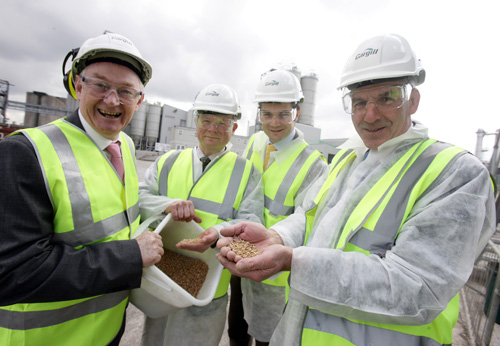
Cargill's new wheat processing plant at Trafford Park, Manchester, was officially opened today, marking the company's continued commitment to Manchester and the North West. The plant, which has seen an investment of around £75 million to convert it from processing imported maize to home-grown wheat, provides a major new local outlet for British arable farmers, at the same time helping to reduce the UK's need to export.
The plant, on Guinness Road, will process about 750,000 tonnes of locally grown wheat per annum into a range of products for the food, feed, paper and pharmaceutical sectors. As well as an outlet for British wheat farmers, the plant will supply UK farmers with one of its products, C*Trafford Gold, a nutritious wheat based animal feed.
Over the last few months, Cargill has consolidated a number of businesses at the Trafford Park site, which is now the hub for its UK food ingredients business, employing over 300 people.
Speaking in Manchester, Frank van Lierde, who runs Cargill's European starches and sweeteners business, said: "This an exciting time for us as it marks the
…more/
/cont…
culmination of a strategy put in place three years ago, which allows us to use locally produced wheat in products for our local UK and Ireland customers. Trafford Park has traditionally been an important supplier to the UK food industry and, with this investment creating the largest wheat mill in the UK, we look forward to continuing to build strong, rewarding and lasting relationships with UK farmers and our customers, while further building on our heritage in the north west."
Martin Douglas, general manager of Cargill's Manchester plant said: "As with any project of this scale, it's a great feeling to see it at completion as we're very proud of what this means for UK wheat farmers as well as for our customers in the UK, Ireland and beyond. What is often not appreciated is that we have undertaken this conversion to wheat while simultaneously continuing to process maize and so a big thanks must go everyone in achieving this feat."
